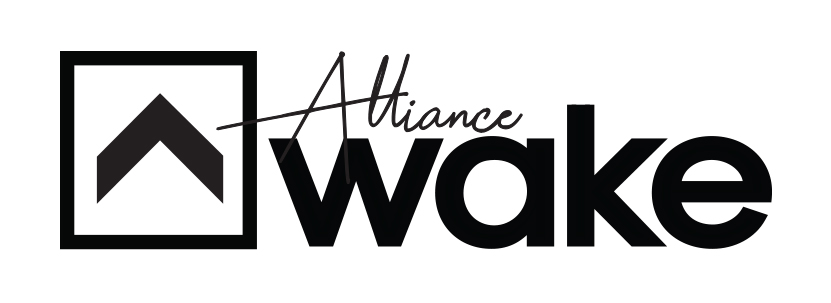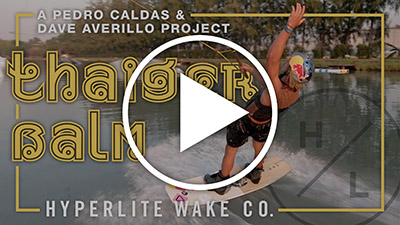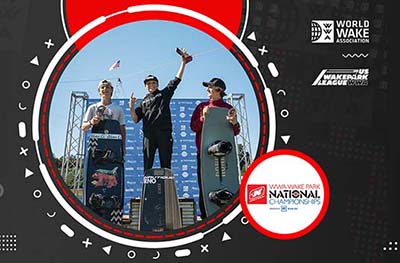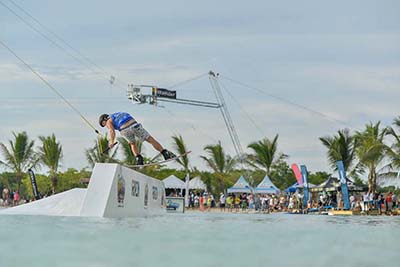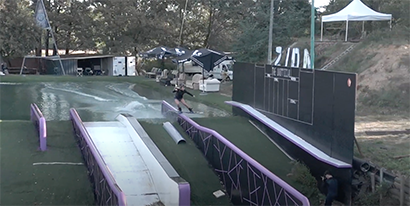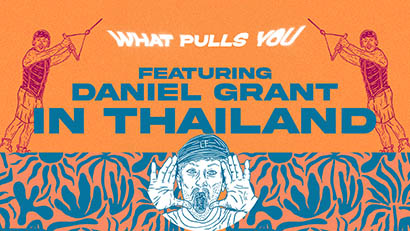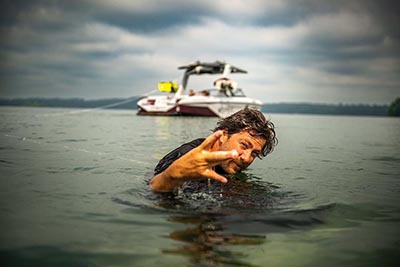2013 Rider of the Year: Bob Soven
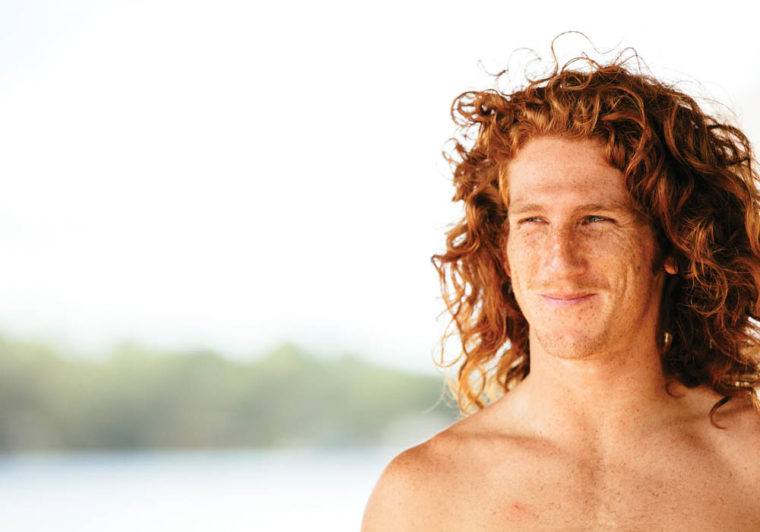
Truth be told, I never would have expected Bob Soven to become an Alliance Rider of the Year. I didn’t know if his riding could ever be as heralded and groundbreaking as a Parks Bonifay or Randall Harris, if he could have the dominating success of a Danny Harf, or the unique impact of a Ben Greenwood or Tom Fooshee. The talent was always there, that was never a question. The real question was if Bob ever cared enough.
For Bob he always seemed happy to just make everybody else happy. He was different, odd, goofy, and had the genetic makeup of Mad magazine’s Alfred E. Neuman. And he embraced all of it. Seriously, if McDonald’s could recast Ronald, they would go with Bob. There was a time where Bob and his shenanigans were everywhere – almost to the point where the character and personality began to overshadow the wakeboarder. This, as Bob puts it, put him in the territory of “loose cannon” – a lot of noise, but not necessarily on target.
A lot has changed with Bob’s riding and approach to the industry over the last couple years though. He’s just as funny, but he’s got a lot more focus – and more than anything it is obvious just how much he cares. These days Bob’s riding isn’t just among the best, it is among the most unique, and he is successfully working every day to be known as one of the sport’s elite all-around riders and biggest ambassadors. He is still a loose cannon, but this time only in terms of when it will fire, rather than where. Our suggestion is to keep watching, because you’re not going to want to miss the show when it does. Suffice it to say, the answer with Bob is the same as it always has been: expect the unexpected.
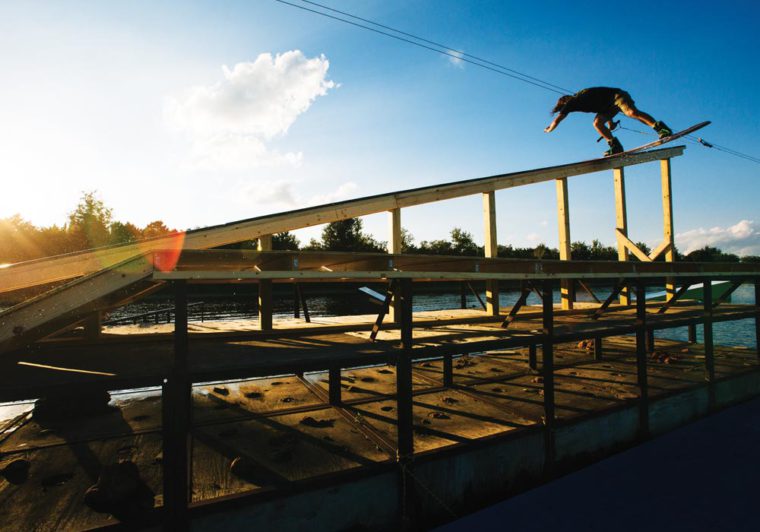
A: You think you’ve become your alter ego “Bob”?
BS: Well it’s not an alter ego, it’s more of a sideshow. A stagename. But am I perpetually on stage now? I think so… which is a scary thought (laughs). I guess I’m always on the clock.
A: Is the hair part of the sideshow?
BS: The hair is Sampson-ite–ish… it’s stuck.
A: You’re worried about losing your powers if you cut your hair?
BS: Not my powers. More my paychecks (laughs). I don’t know, it’s stuck as part of me now. People definitely recognize me for it. I’d definitely swim a lot faster if I shaved it off though.
A: You’ve basically been wakeboarding your entire life. What was it like growing up in Orlando in the sport?
BS: You don’t really know you’re in it because you’re in it. Until you get older and take a step back you don’t realize that this was all I knew growing up. We could probably use a bunch of the Parks Documentary footage and put it in a documentary about me… My mom was Betty Bonifay’s first ski school student and I pretty much grew up at the Bonifays’. There was never a moment where I was like, “Man, I’m really getting into the core of the industry right now” because I was already there.
A: Was there pressure for you to not only wakeboard but to wakeboard really well because of Phil’s success early on?
BS: No, it was almost the opposite actually. I just knew I had to be different.
A: Even as a little kid?
BS: Yeah, pretty much, ‘cause people didn’t like Phil (laughs). He was pretty much hated from 11 to…. (long silence then laughter). He’s got his critics still, but I’d call it 11 to 16 were really his dark years (laughs). But I always remember hearing other people say things about me or reading things about me when I was younger that basically said, “He doesn’t need to be the best, he just needs to be himself and he’ll be fine.” That’s kind of how I’ve always ridden different. I’ve been free to do whatever I want. I wasn’t pressured to do anything.
A: That’s a pretty big realization to make for a young kid. So you knew that you could do what you want – that you could be different – and still be successful?
BS: Phil and I are totally polar opposites in a lot of ways, so I think my being different and doing my own thing was kind of natural. I remember when I was younger and riding – my idea of a pro was pretty structured because of what Phil was doing and because my dad was really into contests and competing – tour, tour, tour, you know? But I wondered if I would be able to make it as a pro without having to do that. I was probably about 15 and I hadn’t won a contest yet or anything, and I wondered if being a pro was really what I even wanted to do. But then the next year I went out and won the Jr. Pro Men’s division (laughs).
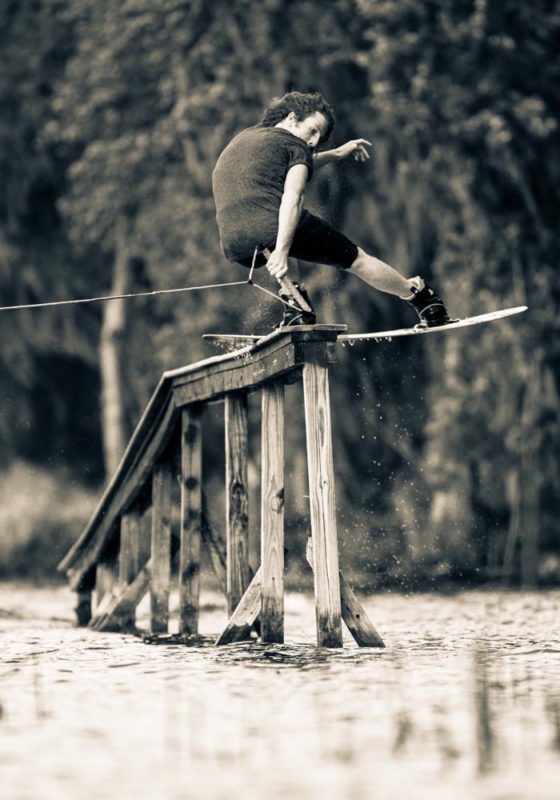
A: So early on you had ideas of making it as a pro without “winning” everything?
BS: Definitely. Or even not being a pro at all. I think when I was 15 I didn’t have plans to be a pro. I didn’t want to have to compete. I didn’t have the motivation to be Number 1 or anything like that. I would wakeboard every now and then and people in the scene still knew me, obviously being in Orlando, but I had other things I was into like other sports and school. But when I started winning everything I knew I was in it and knew I was going to go pro.
A: How did your injury play a part in all of this?
BS: A lot, I think. I hit my head skateboarding when I was 15 and that kept me off the water for six months. The day I came back and rode my wakeboard again I got knocked out again, and that put me out for another six months. So I was basically off the water for a year. That was all during the time when I didn’t know if I’d even want to be a pro, but I was kind of like the spoiled kid who goes broke. I grew up wakeboarding whenever I wanted, or I could not wakeboard at all, it was my choice. But when it wasn’t my choice and I couldn’t do it, I finally realized how much I loved it.
A: When do you think your riding started to take a different turn? The way you’ve ridden the last couple years – and in the last two Less Than 5 contests, for example – is markedly different than how you rode just three or four years ago.
BS: I think it was a lot of… I don’t know, call it “awakenings” or call it “realizations,” but I started riding with different guys, like Jeff McKee. I’d go out with McKee and do KGB 5, toe 9, switch toe 9, whirly dick – all these tricks that were “impressive” but it wasn’t necessarily fun for me and Jeff definitely wasn’t liking it (laughs) and wasn’t afraid to say so.
A: Jeff became your Overall Impression coach?
BS: (laughing) Yeah, he was an Overall Impression coach. A little overbearing, too… (laughs). When I focused on some of the “stylish” tricks I kept getting comments from guys like “That looked awesome” and stuff, so I just kept working on them and going down that path. What really made a difference for me was the first Less Than 5 (2012). Randall went out and just destroyed it – went huge into the flats on everything. I’d gone into the flats when I was younger, and then I didn’t for a bit and got more technical, but I’d never done everything into the flats like Randall did that day. After the first round I asked myself why am I not doing that. So in the second round I went out and tried to do all my tricks into the flats, even though I’d never done a lot of them that way before. But it worked. I knew I’d have the board and rope control from being on the water my whole life, I just needed to put it together. I ended up getting 2nd to Randall that year and from then on I just kept working on doing things bigger, grabbing longer, that kind of stuff.
A: You tried riding pretty differently at Wake Games, too.
BS: Coming into Wake Games this year (2013) I was sick of worrying about contest tricks and stuff that I needed to do to win, so I just told myself to slow it down and have fun. I really thought I could make it through some rounds that way (laughs). I won my first heat and all I did was three 360’s, two 180’s, and a crow mobe into the flats. I didn’t even do a 5. Everybody was telling me how awesome it looked, I was feeling good… (laughs) then I went out in the next round and got last. I was like, “Ahhh, I need to find a happy balance…” I had fun, but it didn’t really make any sort of impact. It was the first two rounds of the contest so nobody was really there to see it other than other riders and industry people. I had a realization that in order for riders to make a change that has an impact they need to get to a point where a lot of people are taking notice, so I told myself I wasn’t going to ride another contest until Wake Open.
A: That’s what lead to your crazy schedule of clinics and demos this past summer? And forgoing the PWT events?
BS: Yeah, sort of. I had the plan to do more of the Liquid Force Free 4 All stuff and other demos going into the year. I kind of had the mindset and question from when I was younger: can you make a career out of wakeboarding if you don’t win? The answer is yes, of course you can, there are so many avenues. Before this season I talked to all my sponsors and said, “I’m not going to do the Pro Tour, I probably won’t be at as many cable events as I’d like, but I’ve got a pretty slammed schedule and I can do this just as well as that. I’m not going to be a contest-winning guy, I can hang, but my impact can be much stronger elsewhere.” I kind of had to say you’re either with me or you’re not, and if you’re not then we have to figure something out.
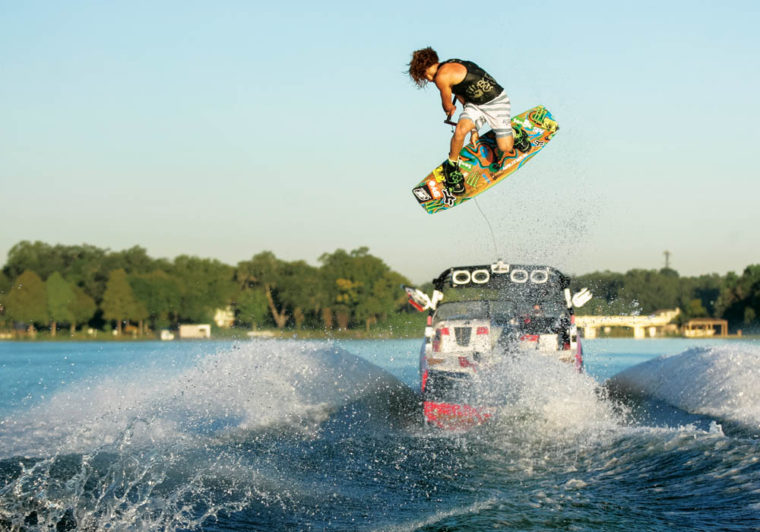
A: Was anybody not with you on this idea?
BS: No, they all were in. After Wake Games I was on the road until just before Wake Open in July. It was crazy, but it was really good. No weekend was wasted, you know? I didn’t lose in a first round and blow an entire weekend. At every event I did my time was put to great use. There are only 120-something days of summer, right? Why waste four days at a contest when you’re getting 30th place riding the way you want to ride? Sure, I’ll shake some hands and sign some autographs, but to be at a demo or clinic and be with somebody while they’re wakeboarding is so much more impactful than for them to watch you ride once or twice at a contest. We don’t have any sort of official count for the Free 4 All events, but we were guessing there were probably around 3,000 people that came through during the tour, and I probably got 700 new riders up. Literally, helping them at the start dock and lifting them up to ride a wakeboard – 700 new riders into the sport. You can’t have that kind of interaction any way else, you can’t do that at a contest.
A: You actually make more of a connection, and therefore more of a lasting impact, in your opinion?
BS: Yeah. When you go through some of these towns on a demo or clinic tour they remember. I had guys say to me, “Man, we remember when Murray came through here ten years ago!” People are really into it, and if you don’t go back to those places and reinvigorate the stoke it’s going to fall off somewhat. If you’re able to give fans a personal experience they’ll really remember it and want to talk about it and tell their friends about it. Being person-to-person with somebody and riding with them can’t be topped. I think Liquid Force realized that big time and has become so popular with their Free 4 All Tour, Trip Across America, and BROstock and Road to BROstock. People literally tell us that BROstock was the best weekend of their lives. Their whole life! That’s insane! How can you put a price on that? Sometimes I find myself wondering why we are pro wakeboarders. “What are we doing and why?” And I think a lot of it is to give people a chance to live that lifestyle through interacting with them at demos and clinics and stuff. ‘Cause my life isn’t actually that glorious (laughs), but it’s great when I can go out and get people to feel what they want to feel.
A: Does it frustrate you that more guys aren’t more proactive about doing some of the demos and clinics?
BS: No, I don’t think it’s totally necessary. I just tell a lot of guys that might not be doing them, or that might not even be given the opportunity yet, to just do something. Just be doing something, you know? Don’t do nothing.
A: Is that a pet peeve of yours? When you’re at an event and some guys are doing nothing?
BS: No, not a pet peeve, but it can be frustrating. I think a lot of guys are starting to learn, not from me, but in general. The industry has changed a lot over the past few years because of the economic recession. We’ve moved from being a lifestyle industry to a production industry – “What can you do for me?” Everyone reassessed what their business is in the industry and started asking the riders, “What are you doing for me and why am I paying you?” Nobody’s getting paid just to be cool anymore. I think the riders in the industry are starting to realize that and take the turn.
A: If you could change one thing about the industry what would you change?
BS: I wish people who boated would stop listening to rap music and start listening to country music. That stuff doesn’t make sense to me. You’re listening to ‘hood music when you’re living the country dream. That’s my pet peeve! (laughing) I understand you might like this music, but don’t you want to embrace what’s happening right now? Tangent, real quick. When I was on the road going from town to town, flying across the country, teaching people to ride, everybody at LF and my family were all telling me, “Don’t get burned out. Don’t get burned out.” If you get burned out with just one month left in the season that last month will kill you. My schedule was crazy and I’d keep asking myself, “How do I keep going?” I actually had to turn some things down.
A: So what kept you from getting burned out?
BS: Country music (laughs)! No, but if I was ever starting to feel over it, I’d just remind myself why I was doing what I was doing. A little perspective shift can go a long way. Plus throwing in a little Alan Jackson or some classic rock that can get you in the right mood – it makes you realize this is awesome, and you’re ready to go have another good time. ‘Cause a lot of good times can really not be much fun. Like imagine being a DJ. Yeah, you’re at a bunch of parties, but that’s horrible (laughs).
A: Do you feel doing all those clinics took away from your riding though? Since you were on the road doing so much teaching and not getting a chance to focus on your own riding?
BS: Actually just the opposite, I think. In between some of the stops I was able to be on the road a lot and get places to ride. Collin (Harrington) was with me a bunch and we got a lot of filming done. And doing so many of these events at different cable parks really helped me tune in my cable riding. I was getting better without even knowing it, really, and I was having a blast. Finally when Wake Open came around I blocked off four days of practice time to get myself ready and that was it. I knew I had the potential to do well in all three aspects of the event and so I didn’t want to take it lightly.
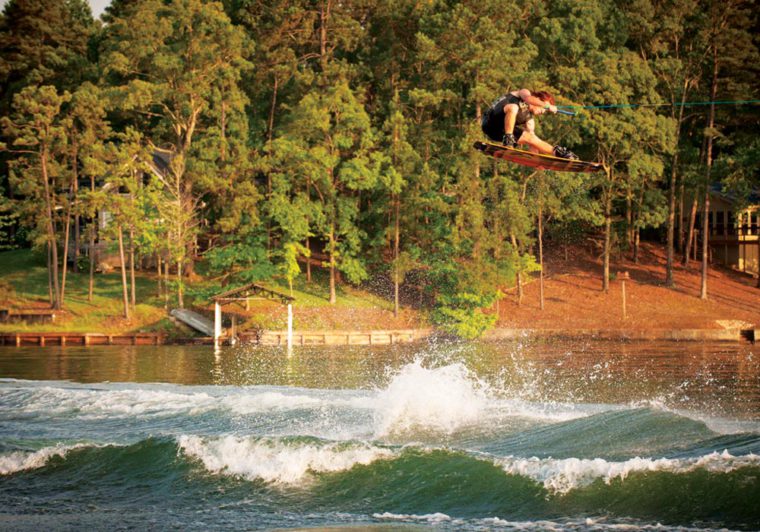
A: What was Wake Open like for you? Were you expecting to do well?
BS: Wake Open was really important to me because it’s become the contest that encompasses almost everything wakeboarding has to offer. My main goal as a rider this year was to show everybody that I should be taken seriously as an all-around rider – not just behind the boat. I knew Wake Open was the place to do that, especially going against guys like Raph and Rathy. I feel like after winning the Big Air event and doing well in boat and park some of the guys started to look at me in a different way. I wish I’d done better – I didn’t ride as smart as I should have in the Park event, but I’m really happy to have won Big Air.
A: You wrote a Matters article for the June issue of Alliance about your belief that the most successful riders in the future will be the most well-rounded riders.
BS: You have to be because there is only so much you can do on a wakeboard. That’s my big push for diversification. At what point is just doing one thing enough? If you can do everything then you can continue to push everything. You can push everything a little each year. I feel like if you’re just limiting yourself as a rider to one thing, be it boat, rails, cable, winching, etc, then it’s just going to get stale.
A: At what point did you start to make this realization and decide to diversify your own riding?
BS: I think I’ve always wanted to be a well-rounded rider. For me life is all about blurring skills. That’s something I’ve used as a little mantra for a while. A couple years ago I looked at the best park riders and I knew I couldn’t beat them – couldn’t even get close. I spent all last winter at the cable – I was there a ton – just trying to get better and better. With all the cables I’ve been going to for clinics and demos, too, I was really able to push myself and step my riding up. For me I’ve always been about pushing myself, because if you’re not progressing you’re not getting better. I knew I wasn’t getting much better at boat at the time, but I knew I could get a lot better at cable. At first it was just a desire to get better because it looked fun, but then there was the realization that there’s a lot more value that comes with being able to do it all. Like a sponsor can send me to a cable now for a clinic or demo and it’s not an issue. For me some of the thinking was along the lines of how embarrassing it would be to be considered one of the top professional wakeboarders in the world and you get to a cable and some local kid totally shows you up. That kid is paying for an annual pass to do laps and you’re getting paid to be there and can’t even ride it very well. Where’s the justice in that?
A: Has the growth of cable in the States opened your eyes and helped shape some of this thinking for you?
BS: Definitely. I’ve been going to a lot of cables all over the world the past couple years and you can see the difference and growth in the sport at each one. There were definitely times where I was blown off the water by a local kid. I’d get there and be like, “Sorry guys, I’m just OK at riding this…” And I’m supposed to be the elite athlete! Eventually my mindset shifted and I told myself that it’s still wakeboarding. It’s all wakeboarding – you’re still on a wakeboard. There’s no reason for me not to be good at this. For me the divisions of wakeboarding are an outlet for new creativity and growth as a sport as a whole. Sure, there are some unsponsored kids out on their home lakes who could easily beat Daniel Grant (on his wakeboard) behind the boat, but not Tom Fooshee. I think there’s a lot to speak for that. If I’m going to be relevant in this industry for ten more years I can’t limit myself, I have to be able to produce in order to make it.
A: Has Tom been a big influence for you the past couple years as you’ve concentrated on cable and being a multi-faceted rider?
BS: Definitely. Tom has been huge – he’s been my biggest advocate in terms of raising my game competitively. Even beyond competitive riding – Tom has been a big influence to me on what it means to be a pro rider today. He and Murray are unbelievable. At Nationals after the first couple laps around the cable Tom comes up to me and says, “You’re gonna win, Bob.” Tom’s a consummate pro – but he’s literally coming up to me, as a fellow competitor, and telling me I’m going to win. I’m like, “Tom, it’s only the quarterfinals and we’re in the same heat! Why are you telling me this?” (laughs). Sure as shit I ended up winning, I had a great run. Afterward Tom just came up to me and said, “I knew you had it in you.” After that I really wanted to do well at the final Triple Crown stop at OWC. Of course right before the contest starts Tom comes up to me again and tells me, “It’s your home cable. You’ve got this.” The semifinals and finals were insane, everybody was riding so well. I was really pumped to win, because for me it just cemented everything I’d been working on and proved that it wasn’t a fluke, you know? It was a great way to end the season for me.
A: So you’ve taken on the cable world and done really well, and you’ve also been winching a bunch more. What’s next?
BS: I’d love to find a unique winch spot that nobody’s ever done. That to me is pushing the sport a lot right now. The Shredtown guys and what they’re doing are awesome. I think they’ve opened a ton of eyes as to what’s possible on a wakeboard. I give those guys so much credit. The missions they go through to find spots, scout them out, and try to hit them take a lot of time for a short clip. Their creativity is so refreshing though.
A: Any other influences recently?
My biggest influence recently has been Oli (Derome). He’s the one that really pushed me to be more than just a boat rider. We started going to OWC a bunch and before that I could only boardslide and front lip every rail there. That’s all I could do. Oli was the one that made me start riding a board with more flex at the cable. He told me I couldn’t ride a stiff board at the cable because I wouldn’t be able to feel anything. He said I needed to be able to feel the rails more and feel where your press is at. We went to the cable so much for an entire winter and it helped me a ton.
A: How do you manage to continue pushing your own riding, be a representative on and off the water for your sponsors, and still do the college thing? If your career is going so well why do school right now?
BS: Man, not a lot of people know I’m going to school. Well, I’m not a full time student. Sometimes I wish I was (laughs), and sometimes it actually feels like I am, but I’m not. There are definitely times where I’m not getting a lot of sleep because I’m catching up on work or studying for an exam, but I try to push through. Right now I’m on an eight-year track (laughs), but I’m in no rush to be done or get out. I’m still pushing my riding and being a pro and I want to do this for at least the next decade. Murray is proof that you can push and still be successful – still make an impact – and be relevant. I watch Murray ride today and it still gets me stoked and pushes me. The point of irrelevance and lack of inspiration is when I’ll be done. I don’t need to get fired. That’s kind of my thing with school, is that I can step out and have something else.
A: What’s interesting about you though is that other wakeboarders have done college, but none of them have arguably been as relevant of a professional in the industry as you are while also balancing school work.
BS: I won the Wake Park Triple Crown stop at OWC on a Sunday and on that Monday I had to take a calculus midterm (laughs).
A: What do you think you missed out on by not doing the PWT this year?
BS: I’ve said it before, but I give a ton of credit to the guys that do the Tour. It’s a grind. To put yourself in that position to have to do well in order to pay for your weekend – and to have to do that weekend after weekend after weekend – it’s tough. For me it’s hard to not be there when some fans might have been expecting me to be there, like I’d hear about it on some social media stuff, but it’s tough, I can’t be everywhere at once.
A: What were the best and worst things about the whole Wake Brothers experience?
BS: Best part was honestly just getting to be me and go to an event and be Bob Soven. I feel like the more people who know who you are the more good you can do. And I think being recognizable is really important for our industry because it is smaller. It gives you credibility and it gives events credibility, so to give exposure like that to the sport and to sponsors involved in the sport was huge, I think.
A: And the worst thing?
BS: The worst was filming it. Four months of hell. Twelve hours a day, six days a week. Sometimes we would just do twelve hours of interviews for two days in a row. And me and Phil don’t really get along – that’s pretty obvious – we’ve got two totally different philosophies – so those interviews were tough.
A: Do you think the show made your relationship worse?
BS: I told them before we started that if they’re trying to do what they were pitching it would not work for 12 episodes. I told them that me and Phil wouldn’t last because he hates everything about me, and I’m definitely not fond of his thinking (laughs). There were times when (we’d be filming) and he’d freak the f*#% out, and that was what was inevitable. Why would you put us next to each other in two chairs for four months? There were times where it was just crazy. One time Rusty said to me when we were filming, “This is the hardest thing ever.” It sounds ridiculous, but the hours on top of the tension and trying to make it work were insane. It made me realize how hard I can actually work in wakeboarding and still have fun. I didn’t need to be unhappy as a wakeboarder, and filming that show made me unhappy. It was too much stress.
A: Would you do it again?
BS: No. I feel too responsible to do my job as a wakeboarder and trying to do the TV show took away from that focus. I’m not a reality TV star. I’m not a Kardashian. I have a job. That TV show might have been good for my job at the time, but it’s not my actual job, and doing it was taking away from my actual job. That was another big realization for me: there is more to the sport than just getting exposure. There were a lot of things from that whole experience that play into the way I think now.
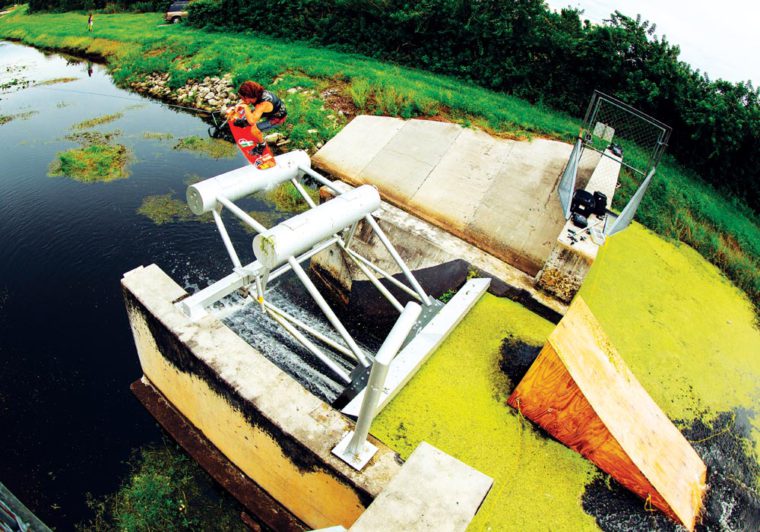
A: Suffice it to say your last two years have been pretty crazy. What’s next for Bob, now that you’ll be the reigning Rider of the Year? Have you thought about it?
BS: Oh I’m always thinking (laughs). 2014 is gonna be just as busy. It will be similar to last year, but I have a little better plan of attack going into the year in terms of scheduling where I need to be and when. I want to give myself more time to work on some video projects – I’ll be traveling with a winch next year so anytime we see something we can try to get good video.
A: What does it mean to you to be the Rider of the Year?
BS: It means I played my cards right (laughs). No, to me it just means I must be doing something right. At the end of the year I knew I didn’t have the best year ever, but I felt like I had a good year. I knew I’d missed some things and tried to do a lot of others. I tried to be there when it mattered though. When I found out I’d won I thought, “Wow, I must be doing something right.” I’m glad I won it now with what I did, just to show that there are other ways to make it as a pro and to have a big impact on the industry.
